University Research: FOREX from Islamic Perspective Analysis
VerifiedAdded on 2022/09/09
|6
|1351
|22
Report
AI Summary
This report provides a literature review on FOREX trading from an Islamic perspective. It explores the Islamic banking law's stance on FOREX, focusing on the prohibition of interest (riba) and its implications for credit applications. The report analyzes the Bay Al-Sarf mechanism for currency exchange, including conditions for validity and the role of wa’d mulzim. It discusses the permissibility of forward exchange and the application of Sharia principles to FOREX products, including hedging instruments. The report references journal articles that evaluate the compliance of online Islamic FOREX trading with Islamic principles and the differences between Islamic and conventional FOREX products. It highlights the importance of understanding the role of regulations and rules of banks in creating and managing financial products in the context of Islamic FOREX.
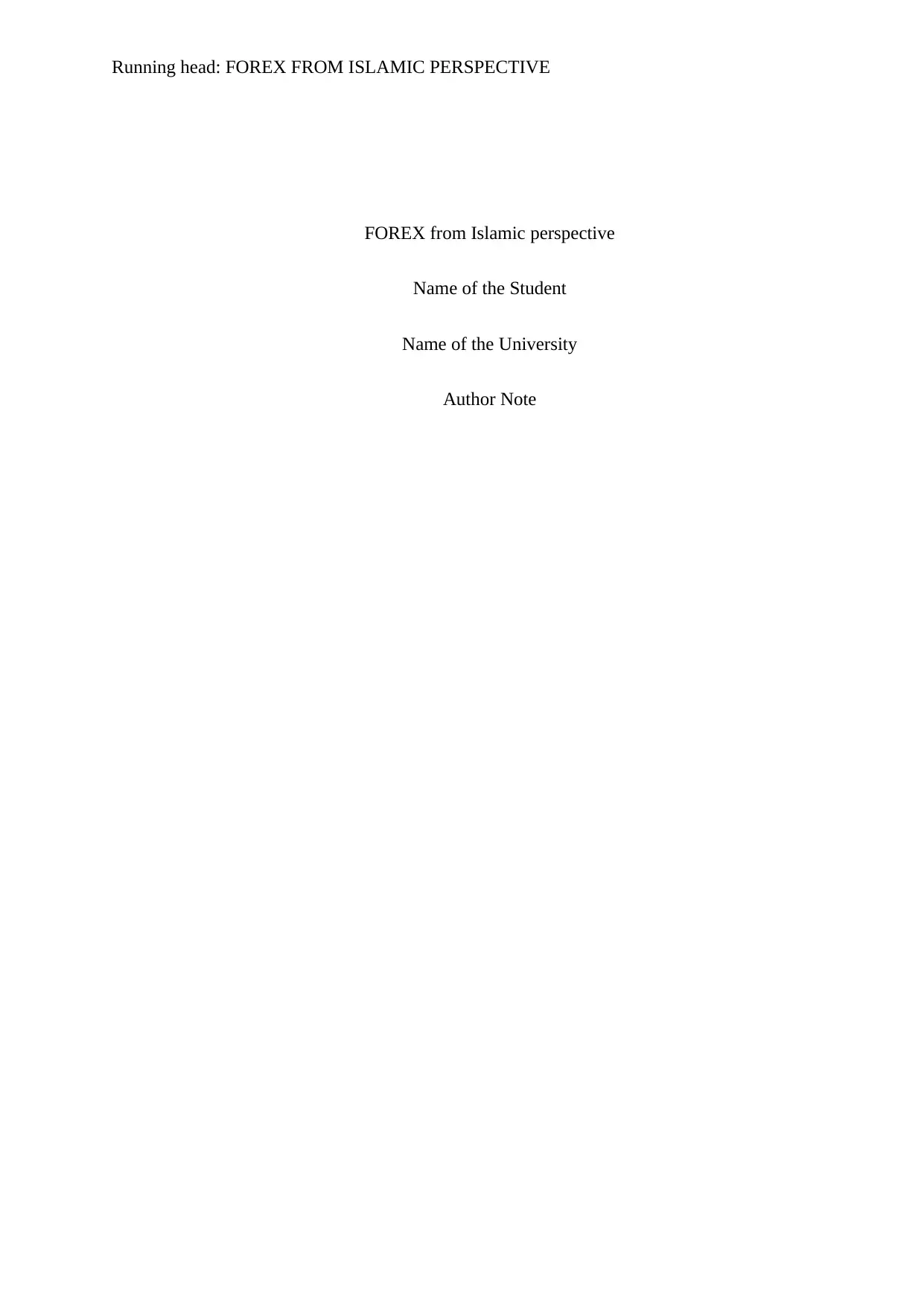
Running head: FOREX FROM ISLAMIC PERSPECTIVE
FOREX from Islamic perspective
Name of the Student
Name of the University
Author Note
FOREX from Islamic perspective
Name of the Student
Name of the University
Author Note
Paraphrase This Document
Need a fresh take? Get an instant paraphrase of this document with our AI Paraphraser
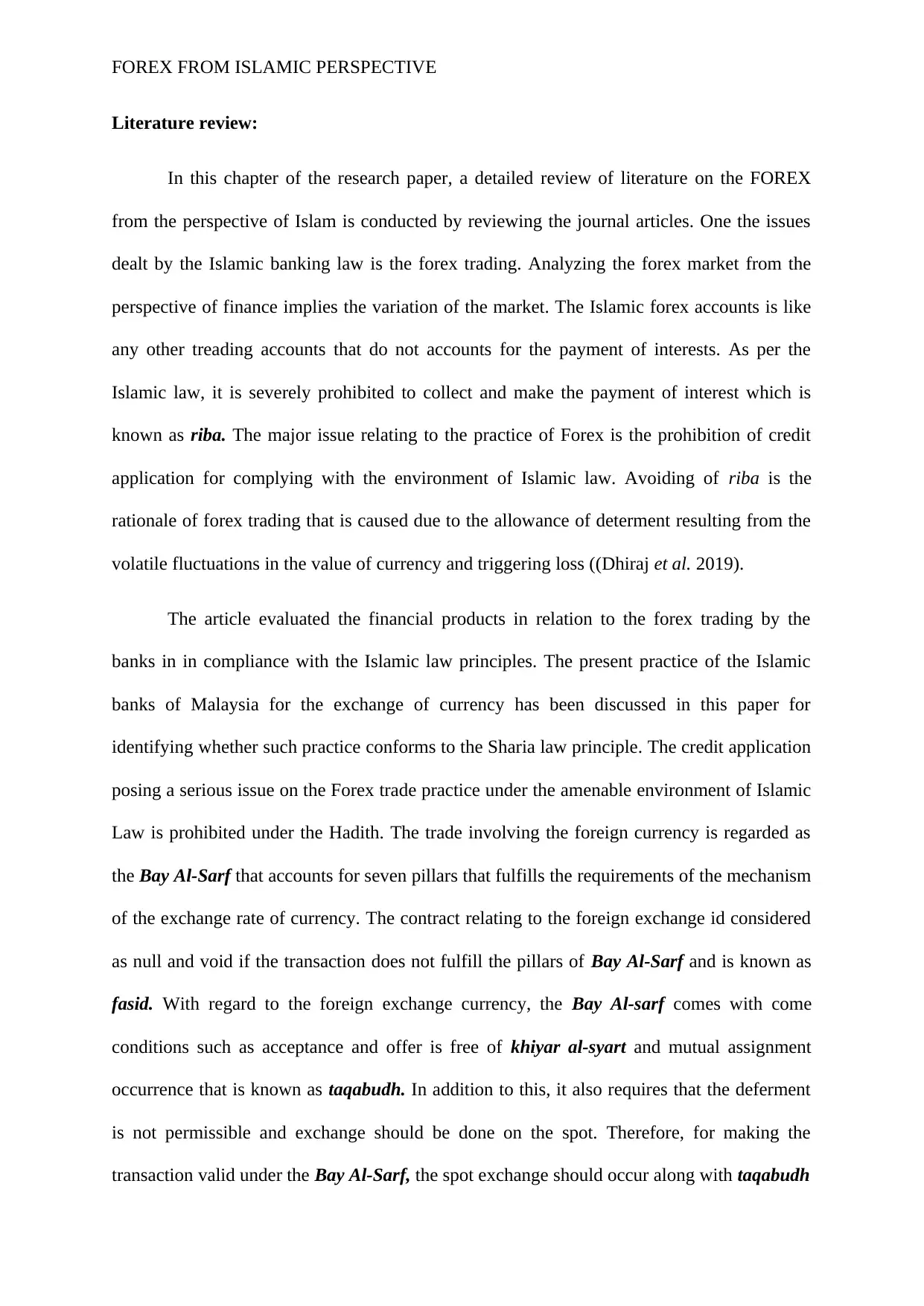
FOREX FROM ISLAMIC PERSPECTIVE
Literature review:
In this chapter of the research paper, a detailed review of literature on the FOREX
from the perspective of Islam is conducted by reviewing the journal articles. One the issues
dealt by the Islamic banking law is the forex trading. Analyzing the forex market from the
perspective of finance implies the variation of the market. The Islamic forex accounts is like
any other treading accounts that do not accounts for the payment of interests. As per the
Islamic law, it is severely prohibited to collect and make the payment of interest which is
known as riba. The major issue relating to the practice of Forex is the prohibition of credit
application for complying with the environment of Islamic law. Avoiding of riba is the
rationale of forex trading that is caused due to the allowance of determent resulting from the
volatile fluctuations in the value of currency and triggering loss ((Dhiraj et al. 2019).
The article evaluated the financial products in relation to the forex trading by the
banks in in compliance with the Islamic law principles. The present practice of the Islamic
banks of Malaysia for the exchange of currency has been discussed in this paper for
identifying whether such practice conforms to the Sharia law principle. The credit application
posing a serious issue on the Forex trade practice under the amenable environment of Islamic
Law is prohibited under the Hadith. The trade involving the foreign currency is regarded as
the Bay Al-Sarf that accounts for seven pillars that fulfills the requirements of the mechanism
of the exchange rate of currency. The contract relating to the foreign exchange id considered
as null and void if the transaction does not fulfill the pillars of Bay Al-Sarf and is known as
fasid. With regard to the foreign exchange currency, the Bay Al-sarf comes with come
conditions such as acceptance and offer is free of khiyar al-syart and mutual assignment
occurrence that is known as taqabudh. In addition to this, it also requires that the deferment
is not permissible and exchange should be done on the spot. Therefore, for making the
transaction valid under the Bay Al-Sarf, the spot exchange should occur along with taqabudh
Literature review:
In this chapter of the research paper, a detailed review of literature on the FOREX
from the perspective of Islam is conducted by reviewing the journal articles. One the issues
dealt by the Islamic banking law is the forex trading. Analyzing the forex market from the
perspective of finance implies the variation of the market. The Islamic forex accounts is like
any other treading accounts that do not accounts for the payment of interests. As per the
Islamic law, it is severely prohibited to collect and make the payment of interest which is
known as riba. The major issue relating to the practice of Forex is the prohibition of credit
application for complying with the environment of Islamic law. Avoiding of riba is the
rationale of forex trading that is caused due to the allowance of determent resulting from the
volatile fluctuations in the value of currency and triggering loss ((Dhiraj et al. 2019).
The article evaluated the financial products in relation to the forex trading by the
banks in in compliance with the Islamic law principles. The present practice of the Islamic
banks of Malaysia for the exchange of currency has been discussed in this paper for
identifying whether such practice conforms to the Sharia law principle. The credit application
posing a serious issue on the Forex trade practice under the amenable environment of Islamic
Law is prohibited under the Hadith. The trade involving the foreign currency is regarded as
the Bay Al-Sarf that accounts for seven pillars that fulfills the requirements of the mechanism
of the exchange rate of currency. The contract relating to the foreign exchange id considered
as null and void if the transaction does not fulfill the pillars of Bay Al-Sarf and is known as
fasid. With regard to the foreign exchange currency, the Bay Al-sarf comes with come
conditions such as acceptance and offer is free of khiyar al-syart and mutual assignment
occurrence that is known as taqabudh. In addition to this, it also requires that the deferment
is not permissible and exchange should be done on the spot. Therefore, for making the
transaction valid under the Bay Al-Sarf, the spot exchange should occur along with taqabudh
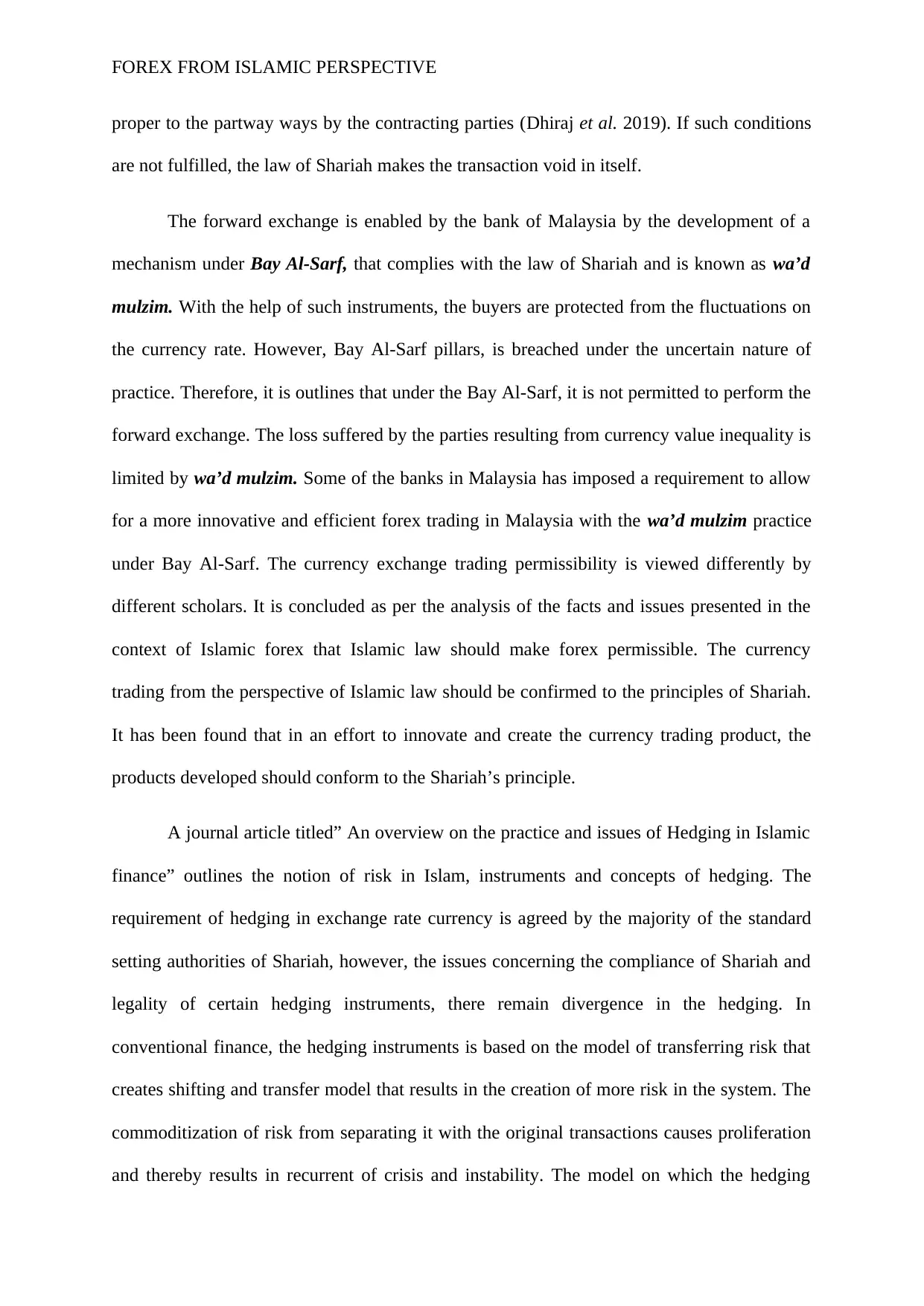
FOREX FROM ISLAMIC PERSPECTIVE
proper to the partway ways by the contracting parties (Dhiraj et al. 2019). If such conditions
are not fulfilled, the law of Shariah makes the transaction void in itself.
The forward exchange is enabled by the bank of Malaysia by the development of a
mechanism under Bay Al-Sarf, that complies with the law of Shariah and is known as wa’d
mulzim. With the help of such instruments, the buyers are protected from the fluctuations on
the currency rate. However, Bay Al-Sarf pillars, is breached under the uncertain nature of
practice. Therefore, it is outlines that under the Bay Al-Sarf, it is not permitted to perform the
forward exchange. The loss suffered by the parties resulting from currency value inequality is
limited by wa’d mulzim. Some of the banks in Malaysia has imposed a requirement to allow
for a more innovative and efficient forex trading in Malaysia with the wa’d mulzim practice
under Bay Al-Sarf. The currency exchange trading permissibility is viewed differently by
different scholars. It is concluded as per the analysis of the facts and issues presented in the
context of Islamic forex that Islamic law should make forex permissible. The currency
trading from the perspective of Islamic law should be confirmed to the principles of Shariah.
It has been found that in an effort to innovate and create the currency trading product, the
products developed should conform to the Shariah’s principle.
A journal article titled” An overview on the practice and issues of Hedging in Islamic
finance” outlines the notion of risk in Islam, instruments and concepts of hedging. The
requirement of hedging in exchange rate currency is agreed by the majority of the standard
setting authorities of Shariah, however, the issues concerning the compliance of Shariah and
legality of certain hedging instruments, there remain divergence in the hedging. In
conventional finance, the hedging instruments is based on the model of transferring risk that
creates shifting and transfer model that results in the creation of more risk in the system. The
commoditization of risk from separating it with the original transactions causes proliferation
and thereby results in recurrent of crisis and instability. The model on which the hedging
proper to the partway ways by the contracting parties (Dhiraj et al. 2019). If such conditions
are not fulfilled, the law of Shariah makes the transaction void in itself.
The forward exchange is enabled by the bank of Malaysia by the development of a
mechanism under Bay Al-Sarf, that complies with the law of Shariah and is known as wa’d
mulzim. With the help of such instruments, the buyers are protected from the fluctuations on
the currency rate. However, Bay Al-Sarf pillars, is breached under the uncertain nature of
practice. Therefore, it is outlines that under the Bay Al-Sarf, it is not permitted to perform the
forward exchange. The loss suffered by the parties resulting from currency value inequality is
limited by wa’d mulzim. Some of the banks in Malaysia has imposed a requirement to allow
for a more innovative and efficient forex trading in Malaysia with the wa’d mulzim practice
under Bay Al-Sarf. The currency exchange trading permissibility is viewed differently by
different scholars. It is concluded as per the analysis of the facts and issues presented in the
context of Islamic forex that Islamic law should make forex permissible. The currency
trading from the perspective of Islamic law should be confirmed to the principles of Shariah.
It has been found that in an effort to innovate and create the currency trading product, the
products developed should conform to the Shariah’s principle.
A journal article titled” An overview on the practice and issues of Hedging in Islamic
finance” outlines the notion of risk in Islam, instruments and concepts of hedging. The
requirement of hedging in exchange rate currency is agreed by the majority of the standard
setting authorities of Shariah, however, the issues concerning the compliance of Shariah and
legality of certain hedging instruments, there remain divergence in the hedging. In
conventional finance, the hedging instruments is based on the model of transferring risk that
creates shifting and transfer model that results in the creation of more risk in the system. The
commoditization of risk from separating it with the original transactions causes proliferation
and thereby results in recurrent of crisis and instability. The model on which the hedging
⊘ This is a preview!⊘
Do you want full access?
Subscribe today to unlock all pages.

Trusted by 1+ million students worldwide
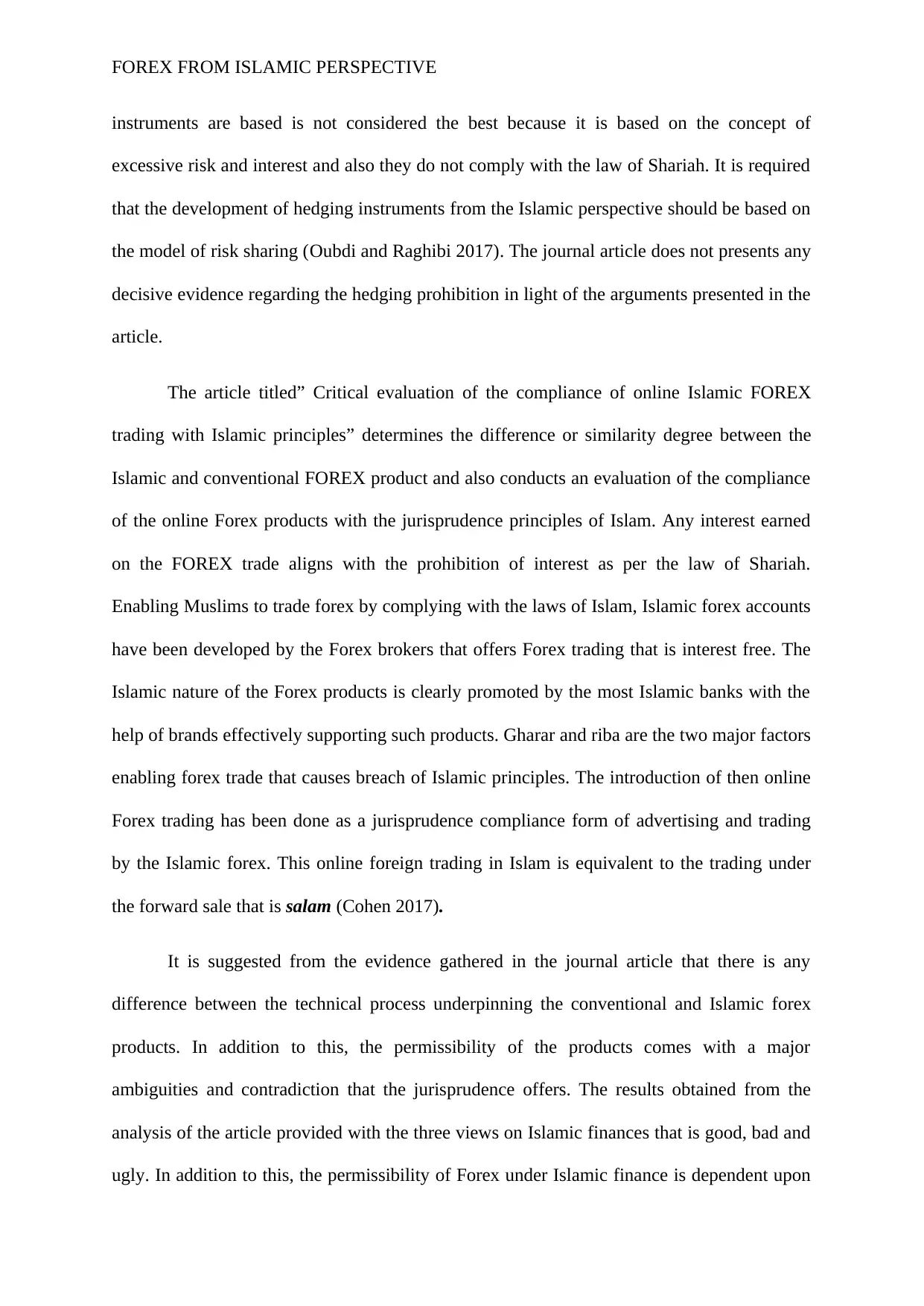
FOREX FROM ISLAMIC PERSPECTIVE
instruments are based is not considered the best because it is based on the concept of
excessive risk and interest and also they do not comply with the law of Shariah. It is required
that the development of hedging instruments from the Islamic perspective should be based on
the model of risk sharing (Oubdi and Raghibi 2017). The journal article does not presents any
decisive evidence regarding the hedging prohibition in light of the arguments presented in the
article.
The article titled” Critical evaluation of the compliance of online Islamic FOREX
trading with Islamic principles” determines the difference or similarity degree between the
Islamic and conventional FOREX product and also conducts an evaluation of the compliance
of the online Forex products with the jurisprudence principles of Islam. Any interest earned
on the FOREX trade aligns with the prohibition of interest as per the law of Shariah.
Enabling Muslims to trade forex by complying with the laws of Islam, Islamic forex accounts
have been developed by the Forex brokers that offers Forex trading that is interest free. The
Islamic nature of the Forex products is clearly promoted by the most Islamic banks with the
help of brands effectively supporting such products. Gharar and riba are the two major factors
enabling forex trade that causes breach of Islamic principles. The introduction of then online
Forex trading has been done as a jurisprudence compliance form of advertising and trading
by the Islamic forex. This online foreign trading in Islam is equivalent to the trading under
the forward sale that is salam (Cohen 2017).
It is suggested from the evidence gathered in the journal article that there is any
difference between the technical process underpinning the conventional and Islamic forex
products. In addition to this, the permissibility of the products comes with a major
ambiguities and contradiction that the jurisprudence offers. The results obtained from the
analysis of the article provided with the three views on Islamic finances that is good, bad and
ugly. In addition to this, the permissibility of Forex under Islamic finance is dependent upon
instruments are based is not considered the best because it is based on the concept of
excessive risk and interest and also they do not comply with the law of Shariah. It is required
that the development of hedging instruments from the Islamic perspective should be based on
the model of risk sharing (Oubdi and Raghibi 2017). The journal article does not presents any
decisive evidence regarding the hedging prohibition in light of the arguments presented in the
article.
The article titled” Critical evaluation of the compliance of online Islamic FOREX
trading with Islamic principles” determines the difference or similarity degree between the
Islamic and conventional FOREX product and also conducts an evaluation of the compliance
of the online Forex products with the jurisprudence principles of Islam. Any interest earned
on the FOREX trade aligns with the prohibition of interest as per the law of Shariah.
Enabling Muslims to trade forex by complying with the laws of Islam, Islamic forex accounts
have been developed by the Forex brokers that offers Forex trading that is interest free. The
Islamic nature of the Forex products is clearly promoted by the most Islamic banks with the
help of brands effectively supporting such products. Gharar and riba are the two major factors
enabling forex trade that causes breach of Islamic principles. The introduction of then online
Forex trading has been done as a jurisprudence compliance form of advertising and trading
by the Islamic forex. This online foreign trading in Islam is equivalent to the trading under
the forward sale that is salam (Cohen 2017).
It is suggested from the evidence gathered in the journal article that there is any
difference between the technical process underpinning the conventional and Islamic forex
products. In addition to this, the permissibility of the products comes with a major
ambiguities and contradiction that the jurisprudence offers. The results obtained from the
analysis of the article provided with the three views on Islamic finances that is good, bad and
ugly. In addition to this, the permissibility of Forex under Islamic finance is dependent upon
Paraphrase This Document
Need a fresh take? Get an instant paraphrase of this document with our AI Paraphraser
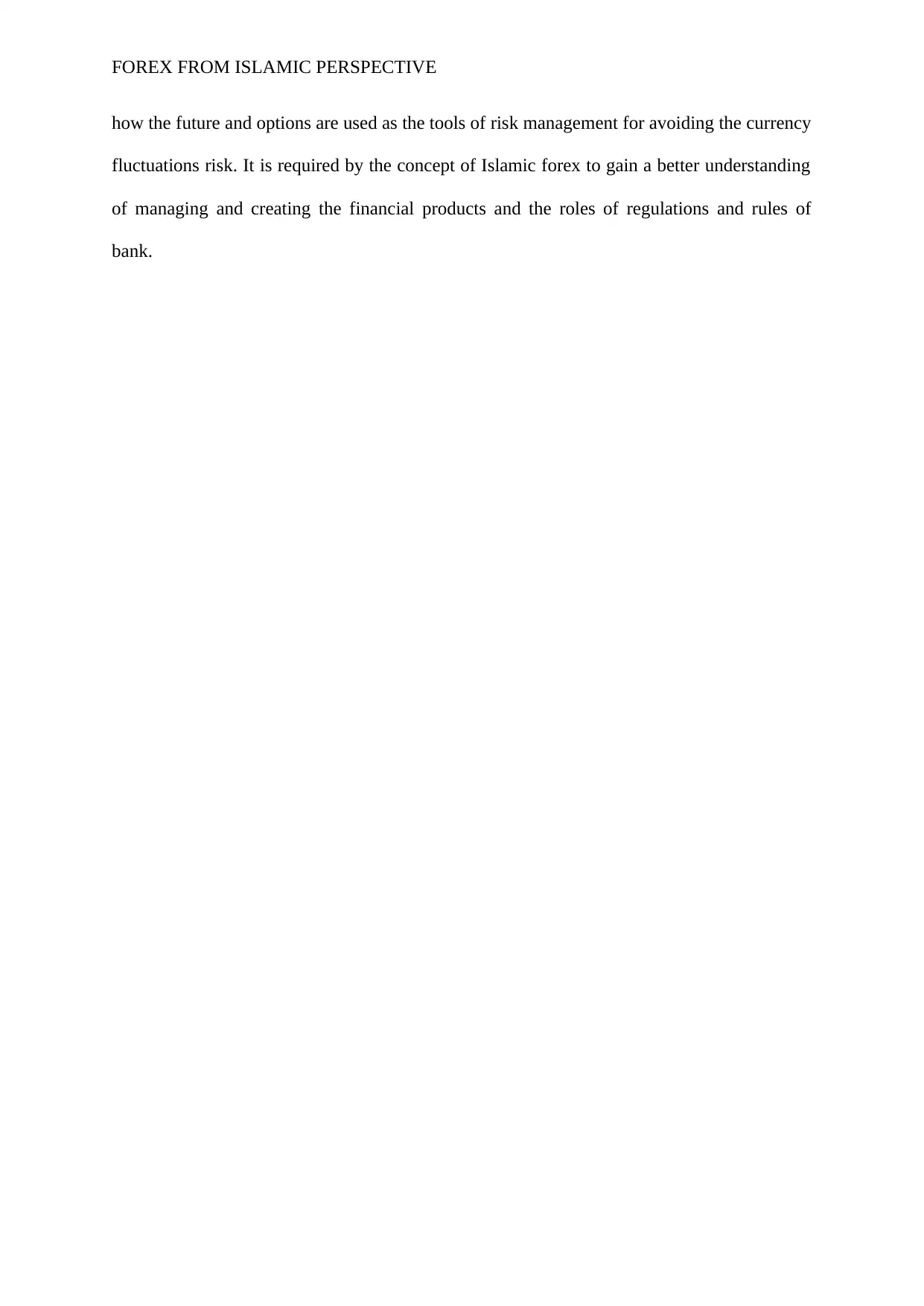
FOREX FROM ISLAMIC PERSPECTIVE
how the future and options are used as the tools of risk management for avoiding the currency
fluctuations risk. It is required by the concept of Islamic forex to gain a better understanding
of managing and creating the financial products and the roles of regulations and rules of
bank.
how the future and options are used as the tools of risk management for avoiding the currency
fluctuations risk. It is required by the concept of Islamic forex to gain a better understanding
of managing and creating the financial products and the roles of regulations and rules of
bank.
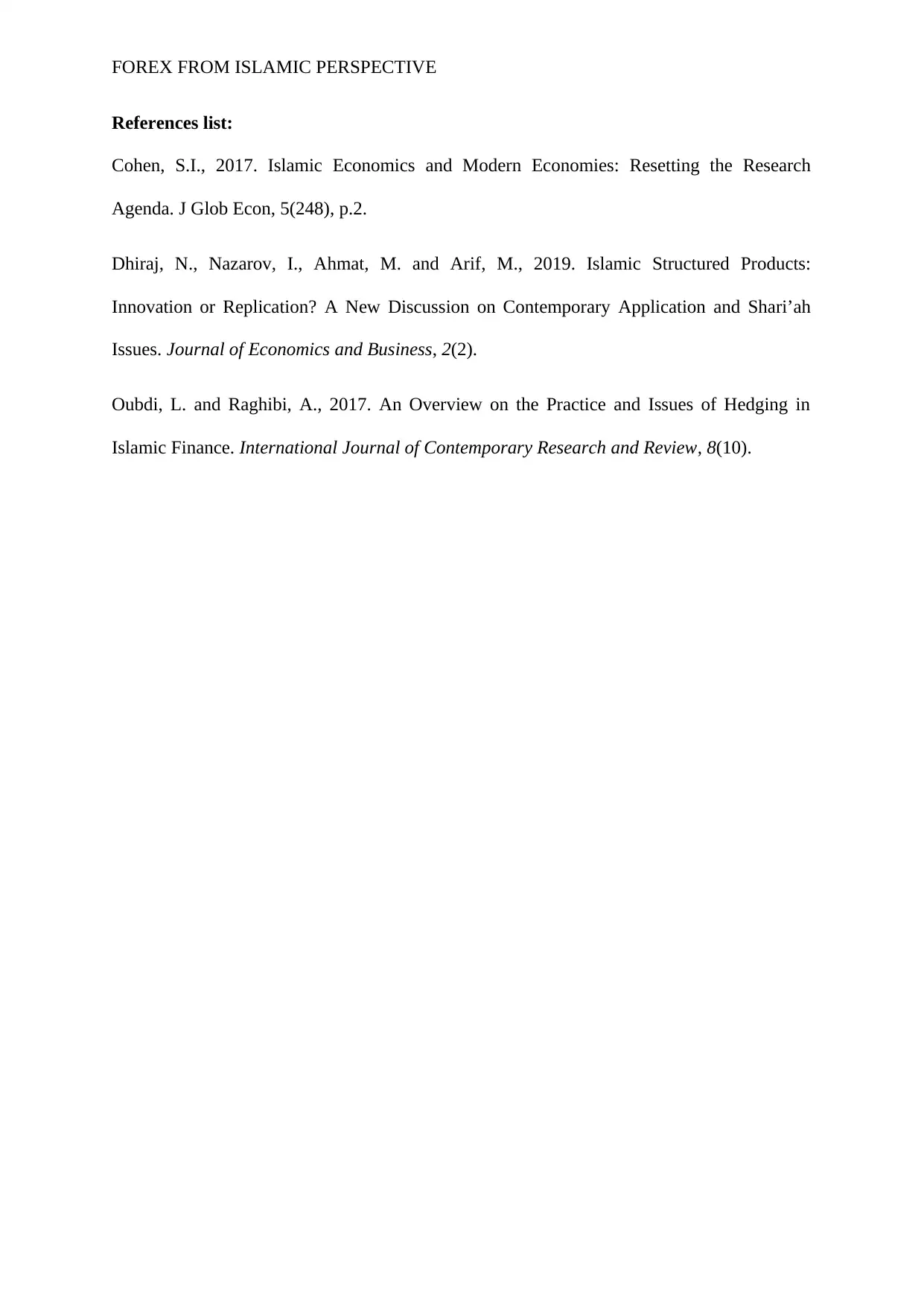
FOREX FROM ISLAMIC PERSPECTIVE
References list:
Cohen, S.I., 2017. Islamic Economics and Modern Economies: Resetting the Research
Agenda. J Glob Econ, 5(248), p.2.
Dhiraj, N., Nazarov, I., Ahmat, M. and Arif, M., 2019. Islamic Structured Products:
Innovation or Replication? A New Discussion on Contemporary Application and Shari’ah
Issues. Journal of Economics and Business, 2(2).
Oubdi, L. and Raghibi, A., 2017. An Overview on the Practice and Issues of Hedging in
Islamic Finance. International Journal of Contemporary Research and Review, 8(10).
References list:
Cohen, S.I., 2017. Islamic Economics and Modern Economies: Resetting the Research
Agenda. J Glob Econ, 5(248), p.2.
Dhiraj, N., Nazarov, I., Ahmat, M. and Arif, M., 2019. Islamic Structured Products:
Innovation or Replication? A New Discussion on Contemporary Application and Shari’ah
Issues. Journal of Economics and Business, 2(2).
Oubdi, L. and Raghibi, A., 2017. An Overview on the Practice and Issues of Hedging in
Islamic Finance. International Journal of Contemporary Research and Review, 8(10).
⊘ This is a preview!⊘
Do you want full access?
Subscribe today to unlock all pages.

Trusted by 1+ million students worldwide
1 out of 6
Your All-in-One AI-Powered Toolkit for Academic Success.
+13062052269
info@desklib.com
Available 24*7 on WhatsApp / Email
![[object Object]](/_next/static/media/star-bottom.7253800d.svg)
Unlock your academic potential
Copyright © 2020–2026 A2Z Services. All Rights Reserved. Developed and managed by ZUCOL.